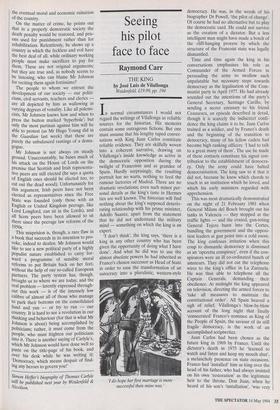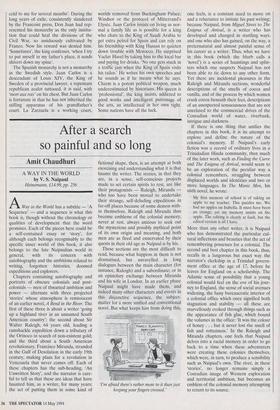Seeing his pilot face to face
Raymond Carr
THE KING In normal circumstances I would not regard the writings of Vilallonga as reliable sources for the historian. His memoirs contain some outrageous fictions. But one must assume that his lengthy taped conver- sations with King Juan Carlos constitute reliable evidence. They are skilfully woven into a coherent narrative, drawing on Vilallonga's inside knowledge as active in the democratic opposition during the twilight of Francoism and as grandee of Spain. Hardly surprisingly, the resulting portrait has no warts, nothing to feed the rumour factories of Madrid. There are no dramatic revelations; even such minor per- sonal details as the king's taste in Hermes ties are well known. The historian will find nothing about the king's supposed deterio- rating relationship with his prime minister, Adolfo Suarez, apart from the statement that he did not understand the military mind — something on which the king is an expert. `I don't think', the king says, 'there is a king in any other country who has been given the opportunity of doing what 11- have done'. And what he did was to use the almost absolute powers he had inherited as Franco's chosen successor as Head of State in order to ease the transformation of an autocracy into a pluralistic, western-style
`I do hope her first marriage is more successful than mine was.' democracy. He was, in the words of his biographer Dr Powell, 'the pilot of change'. Of course he had no alternative but to play the democratic card. He could not survive as the creation of a dictator. But a less intelligent man might have made a botch of the cliff-hanging process by which the structure of the Francoist state was legally dismantled.
Time and time again the king in his conversations emphasises his role as Commander of the Armed Forces in persuading the army to swallow such unpalatable but necessary steps towards democracy as the legalisation of the Com- munist party in April 1977. He had already sounded out the intentions of the party's General Secretary, Santiago Carillo, by sending a secret emissary to his friend Ceausescu, an episode described in detail, though it is scarcely the indiscreet confi- dence the king claims it to be. Juan Carlos trained as a soldier, and by Franco's death and the beginning of the transition to democracy, many of his fellow cadets had become high ranking officers: 'I had to talk to a great many of them'. The use he made of these contacts constitute his signal con- tribution to the establishment of democra- cy. Only the army could have halted democratisation. The king saw to it that it did not, because he knew which chords to touch in an institution which he loved, and which his early ministers regarded with apprehension.
This was most dramatically demonstrated on the night of 21 February 1981 when General Milans del Bosch brought out his tanks in Valencia — they stopped at the traffic lights — and the crazed, gun-toting General Tejero burst into the Cortes, bundling the government and the opposi- tion leaders at gun point into a cold room. The king confesses irritation when this coup to dismantle democracy is dismissed as an 'operetta conspiracy', even if the con- spirators were an ill co-ordinated bunch of amateurs. They did not cut the telephone wires to the king's office in La Zarzuela. He was thus able to telephone all the Captain Generals, demanding their obedience. At midnight the king appeared on television, directing the armed forces to `take all measures to maintain the constitutional order'. All Spain heaved a sigh of relief. Vilallonga's blow-by-blow account of the long night that finally `consecrated' Franco's nominee as King of the People of Spain, the saviour of its still fragile democracy, is the work of an accomplished scriptwriter.
Juan Carlos had been chosen as the future king in 1969 by Franco. Until the dictator's death in 1975 he 'learned to watch and listen and keep my mouth shut', a melancholy presence on state occasions. Franco had 'installed' him as king over the head of his father, who had always insisted on his own 'restoration' as the legitimate heir to the throne. Don Juan, when he heard of his son's 'installation', 'was very cold to me for several months'. During the long years of exile, consistently slandered by the Francoist press, Don Juan had rep- resented his monarchy as the only institu- tion that could heal the divisions of the Civil War, so assiduously cultivated by Franco. Now his reward was denied him. `Sometimes', the king confesses, 'when I try to put myself in my father's place, it sends shivers down my spine'.
The Spanish monarchy is not a monarchy in the Swedish style. Juan Carlos is a descendant of Louis XIV, the King of Sweden of a provincial lawyer, a repentant republican zealot tattooed, it is said, with 'mort aux rois' on his chest. But Juan Carlos is fortunate in that he has not inherited the stifling apparatus of his grandfather's court. La Zarzuela is a working court,
worlds removed from Buckingham Palace, Windsor or the protocol of Mitterrand's Elysee. Juan Carlos insists on living as nor- mal a family life as is possible for a king who chats to the King of Saudi Arabia to get extra petrol for Spain and can rely on his friendship with King Hassan to quieten down trouble with Morocco. He surprised Vaclav Havel by taking him to the local bar and paying for drinks. 'No one gets stuck in a traffic jam when the King of Spain visits his tailor.' He writes his own speeches and he sounds as if he means what he says. Charm is a potent political weapon, much underestimated by historians. His queen is `professional', the king insists, addicted to good works and intelligent patronage of the arts, an intellectual in her own right. Some nations have all the luck.



























































 Previous page
Previous page